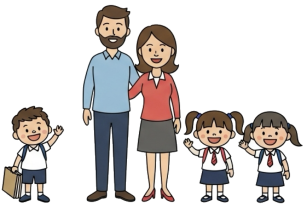
Question More, Action Knowledge.
Remember, at QMAK, we don’t just teach; we empower. We don’t just inform; we inspire. We don’t just question; we act. Become a Gold Member, and let’s unlock your child’s full potential, one question at a time.
![]() In the complex tapestry of life, we are often faced with the daunting task of making decisions in the face of uncertainty. The illusion of certainty, while comforting, can lead us astray, blinding us to the inherent unpredictability of the world. We believe that embracing uncertainty and adopting a probabilistic approach to decision-making is essential for personal growth, effective problem-solving, and ultimately, a more fulfilling life.
In the complex tapestry of life, we are often faced with the daunting task of making decisions in the face of uncertainty. The illusion of certainty, while comforting, can lead us astray, blinding us to the inherent unpredictability of the world. We believe that embracing uncertainty and adopting a probabilistic approach to decision-making is essential for personal growth, effective problem-solving, and ultimately, a more fulfilling life.
In this article, we’ll explore the concept of decision-making under uncertainty, the mental models that can guide us through the fog, and strategies for teaching these valuable principles to children. By developing a more nuanced understanding of the world and our place within it, we can navigate life’s challenges with greater clarity, resilience, and adaptability.
The world is a complex and dynamic system, influenced by countless interacting factors. Perfect information is an illusion, and even the most carefully considered plans can be disrupted by unexpected events. When we cling to the notion of certainty, we set ourselves up for disappointment and limit our ability to adapt to changing circumstances.
Instead of seeking absolute certainty, it’s essential to recognize that most decisions involve some degree of uncertainty. The future is not predetermined, and the best we can do is estimate the likelihood of different outcomes based on the information available to us.
To navigate the fog of uncertainty, we must adopt a probabilistic approach to decision-making.
This involves several key principles:
Several mental models can enhance our decision-making abilities in the face of uncertainty:
This model encourages estimating the likelihood of different outcomes, considering factors like Bayesian updating, fat-tailed curves (recognizing the potential for extreme events), and asymmetries (understanding that our probability estimates might be biased).
![]() Favoring simpler explanations over complex ones can lead to more accurate decisions, as they are easier to test and less prone to hidden assumptions.
Favoring simpler explanations over complex ones can lead to more accurate decisions, as they are easier to test and less prone to hidden assumptions.
![]() Avoiding attributing to malice what can be explained by ignorance or error helps prevent unnecessary paranoia and encourages a more objective analysis of situations.
Avoiding attributing to malice what can be explained by ignorance or error helps prevent unnecessary paranoia and encourages a more objective analysis of situations.
![]() Approaching a problem from the opposite end of the natural starting point (e.g., focusing on what to avoid instead of what to achieve) can reveal hidden opportunities and obstacles.
Approaching a problem from the opposite end of the natural starting point (e.g., focusing on what to avoid instead of what to achieve) can reveal hidden opportunities and obstacles.
Helping children develop a healthy relationship with uncertainty and equipping them with the tools for effective decision-making is one of the greatest gifts we can give them.
Here are some strategies for introducing these concepts to young minds:
By integrating the principles of decision-making under uncertainty into our own lives, we can navigate challenges with greater clarity and increase our chances of success.
Here are some ways to apply these concepts for personal growth:
In a world filled with uncertainty, the ability to make effective decisions is a vital skill for personal growth and success. By embracing a probabilistic approach, utilizing mental models, and continuously updating our understanding, we can navigate the fog of complexity with greater clarity and confidence.
At QMAK, we believe that nurturing these skills in both children and adults is essential for fostering a society of adaptable, resilient, and creative problem-solvers. By teaching the principles of decision-making under uncertainty, we empower individuals to face life’s challenges with courage, curiosity, and a growth mindset.
So let us venture forth into the unknown, armed with the tools of probabilistic thinking and the wisdom of mental models. Let us embrace the uncertainty that permeates our lives, not as a source of fear, but as an invitation to learn, grow, and make a positive impact on the world around us.
In the end, the path to personal growth and fulfillment lies not in the illusion of certainty, but in the courage to make decisions in the face of the unknown. By developing this courage and the skills to navigate uncertainty, we open ourselves up to a world of boundless possibilities and the potential for transformative growth.

Remember, at QMAK, we don’t just teach; we empower. We don’t just inform; we inspire. We don’t just question; we act. Become a Gold Member, and let’s unlock your child’s full potential, one question at a time.